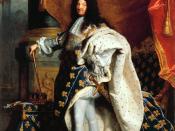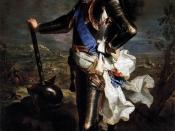Louis XIV: THE SUN KING
By merely speaking the name "King Louis XIV" an image is conjured up in one's mind that carries with it an impression of the era in which he reigned, and the way in which he presided over France as an absolute monarch. Royalty at its finest, Louis's image of success is refined, stately, and majestic. It is in this image that the history of Louis the XIV has been written about; a persona of a king who had to calculate his actions, whether they be governmental in nature, or even his social exploits. Under a microscope during an era where the people had a heightened interest in the affairs of the king and the nobility, to see where their money was going and how they were being governed, King Louis XIV faced tremendous pressure.
Pressure never caused Louis to break down or weaken his resolve.
In fact, he rose to the challenge; but not without the aid of an invisible network of forces in motion behind the scenes. Louis's relationship to the various social classes within France at the time was crucial to maintaining power and control. He learned to play to these relationships, and use them to his advantage. France's nobility and government was able to run like a well-oiled machine due to Louis XIV's calculated efforts to maintain balance in his relationships, his laws, his nobility, and his power. Absolute power is said to "corrupt absolutely". However, in the hands of the competent ruler, absolutism can be a vehicle for implementing moral laws and justice, uniting a country, and promoting peace. Let us first look at what absolute power is before we explore how Louis XIV's relationships with France's various social classes upheld and constituted absolutism.
According to William Beik, absolutism...


